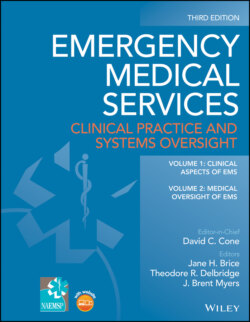Читать книгу Emergency Medical Services - Группа авторов - Страница 484
Infection
ОглавлениеRenal patients, especially those with ESRD, have an increased risk for infection, with greater associated morbidity and mortality. Uremia is associated with dysfunction in both innate and adaptive immune systems through complex cellular alterations. Those with indwelling devices for dialysis access have an obvious source for contamination and seeding with bacteria. Transplant patients on immunosuppressive therapy additionally are immunocompromised from the medicines required to reduce risk of graft rejection [22]. With sepsis and bacterial infections being common in ESRD patients, the prehospital clinician must be able to recognize patients with severe sepsis and septic shock and treat them with appropriate fluid resuscitation. Clinicians often are hesitant to initiate administration of 30 mL/kg fluid bolus over the first 3 hours, as suggested by the Surviving Sepsis Campaign, due to concern for triggering pulmonary edema and respiratory failure. Studies, however, have suggested that there is no increased harm among ESRD patients, with the caveat that further prospective studies are needed [23, 24].
